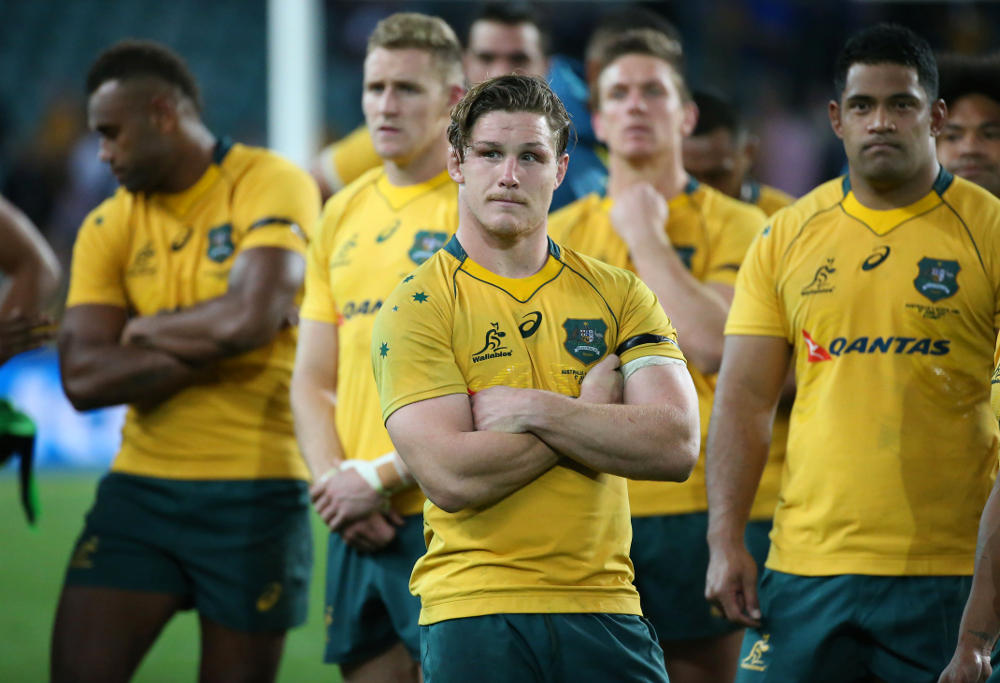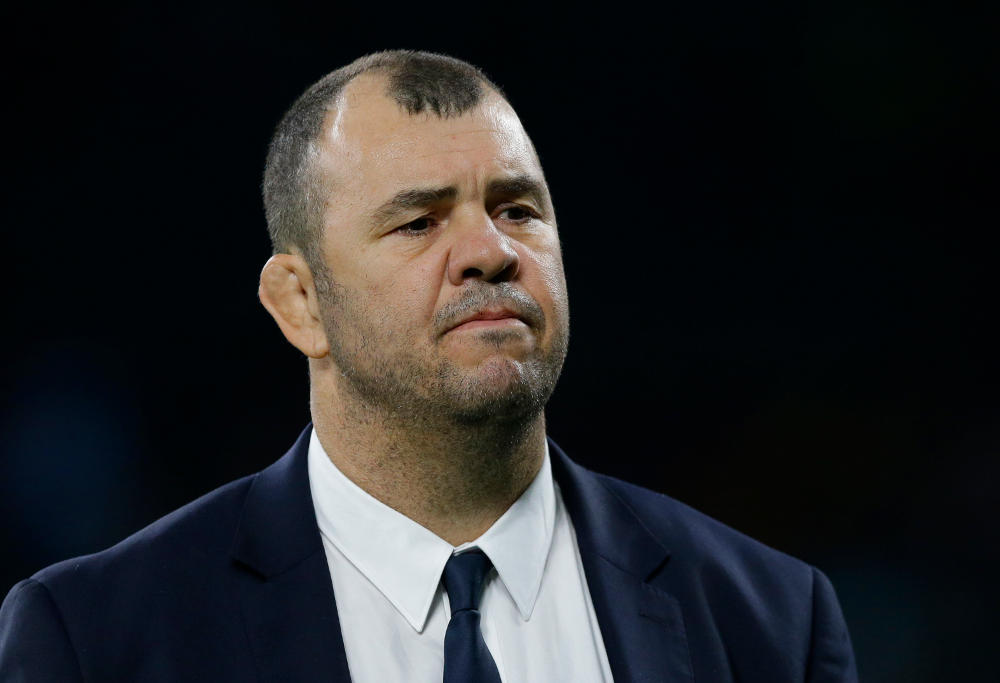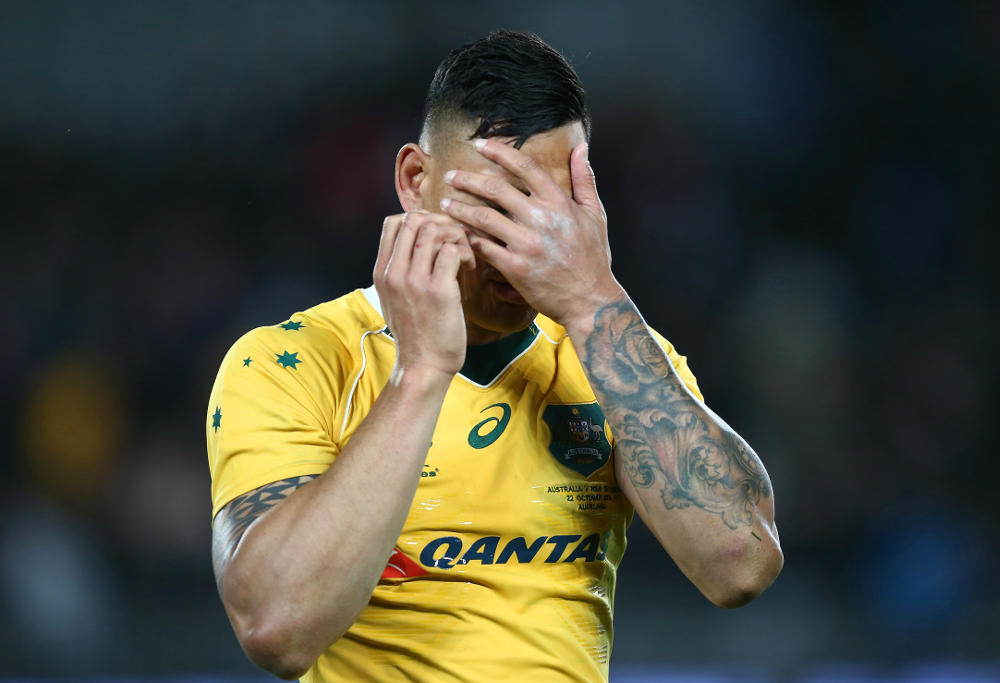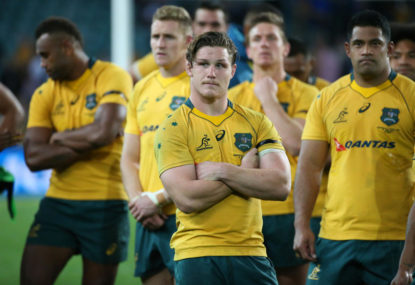So much for Michael Cheika’s aspiration to go into the Rugby Championship with a settled starting side and with the momentum of three successive victories from the Wallabies’ June Tests.
On the evidence of the dismal loss to Scotland 24-19, Cheika and the Wallabies are facing an annus horribilis in 2017.
Scotland were hardly impressive opponents. They played with the spirit they habitually bring to the Test arena, but they lacked game-breakers in the backs and forwards.
The only world-class player they had on the field was playmaker Finn Russell. And against a poorly organised Wallabies defence, Russell’s occasional sleight of hand passing was enough to disconcert a system that was so simplistic that any coherent attack by Scotland created chaos.
The one time Scotland got an ensemble attack going, the Wallabies defence was reduced to a shambles with tacklers getting in each other’s way or failing to read where the attack was going to go. Flanker Hamish Watson subsequently crossed over for what became the decisive try of the Test.
Throughout the commentary, Rod Kafer was pointing out that the spacing of the Wallabies defensive line was too bunched. This bunching created the opportunities for outside breaks which, until late in the Test, Scotland were not good enough to exploit.
Kafer has been banging on about the spacing in the Wallabies defensive line for a year or so. He has been proved right time and time again. Against Fiji, the Wallabies missed 34 tackles. And against Scotland, they conceded three tries.
If Kafer, admittedly a shrewd thinker about rugby tactics, can identify the problem, why can’t Wallabies defensive coach Nathan Grey do the same thing, and make the necessary adjustments?
Remember, too, this defensive line spacing system is the same sort of system used by Grey, with an obvious lack of success, at the Waratahs this year. So why is Michael Cheika allowing this failed system to be used by the Wallabies?
There should be question marks hanging over the captaincy of Michael Hooper, too. Hooper is a great player but he is a very ordinary captain.
To begin with, he seems to make wrong decisions at critical times. He has done this with the Waratahs and the Wallabies, so there seems to be something systematic at fault with his reading of how games are unravelling.
Take, for example, Hooper’s decision in the Test not to knock over a relatively easy penalty shot in the 72nd minute when the Wallabies were down by five points.
You kick the penalty and then have five minutes, a long time at the end of a Test, to either score a try or kick a goal to win the match. By not taking the easy three points, you bank everything on scoring the try from a rolling maul.
The point here is that if the Wallabies had kicked the penalty, they would have opened the door to victory, perhaps, by allowing themselves several chances of winning the match.
Moreover, if you only need to kick a penalty or a field goal to win the Test, the opposition has a more difficult task of defending your attacks as they have to do this without conceding a penalty.
As it happened, the Wallabies muffed their lineout maul. Hooper explained his decision to opt to score the try from the driving maul this way:
“I really thought we had momentum. I am the ultimate believer in our guys to do the job. Maybe too much so tonight. Hindsight, we maybe could have gone to the goal just to mount a bit of pressure.”

(AAP Image/David Moir)
I’m all for loyalty and belief in your teammates. But I am also for realism. In Test matches defence generally trumps attack. A certain desperation on defence can often nullify the best of attacking intentions.
Moreover, just because there were vulnerabilities by Scotland to the rolling maul earlier in the Test, most national sides (as Fiji showed a week earlier) can thwart the maul from time to time.
I would add another point, too. A problem with Hooper’s captaincy is that he is too wedded to what for a better description might be deemed a ‘Boy’s Own’ sensibility about how big plays might unfold.
He has too high an opinion of the abilities of his teammates.
The fact of the matter is that, against Scotland, the forwards did not ‘do the job’ from the rolling maul. Last week I argued for Bernard Foley to be made captain of the Wallabies. And I make this assertion again.
This is not a criticism of Hooper as a player or a person. He is a dynamo as a player. He is often an irresistible force. He has more guts and drive than the rest of the pack put together.
But he is not captaincy material. Hooper’s play is fired by emotion, which is terrific for a player. But is not terrific for a captain. The captain must be calculating, less emotional and more pragmatic. Someone like Foley.
In retrospect, the Test was sort of lost right at its beginning when Adam Coleman tried to manhandle a Scotland player over the touch line.
Coleman was trying to impose his bullying style (which is the Cheika method) on the Scots players with an over-aggressive form of intimidation.
Referee Wayne Barnes was having none of this. He gave Coleman a warning and the enforcer played like a Samson with his hair shorn from this time onwards in the Test.
The Wallabies’ pack (and their coaches) need to look at the way the British and Irish Lions’ pack monstered the New Zealand Maori forwards at Rotorua.
The devastation came through massive scrummaging, smart and aggressive play in the lineouts and with smashing play on defence and attack. It didn’t come from blatant thuggery.
You don’t need thuggery or after-the-play niggling to intimidate and overwhelm your opponents if you’ve got ‘The Game’.
What was interesting to me is that when one (of the few) Lions lineout mauls went wrong, the coaching staff poured over an iPad replay of it to work out why it had failed.
Contrast this smart, unemotional response to what was happening on the field to Cheika’s antics in the coaches’ box. I can never understand the value of a coach showing so much emotion. How can this help his side?
And I ask another question: were Cheika’s over-emotional responses in the coaches’ box responsible for Hooper’s own over-emotional response to go for a rolling maul with the Test in the balance in the 72nd minute of the game?
Cheika’s reading of how the Wallabies played the Test is interesting. The players did not show the intensity they exhibited at training during the match, he told the media after the loss:
“You don’t win at training, you win at the game, you’ve got to come to the game with your attitude on, and again, we weren’t off completely, we were just a little behind the pace we needed to set to win the game.”

(AP Photo/Alastair Grant)
I am not buying this line.
It seems to me that Cheika is training and selecting his players on intensity shown at training. But what about the skills that Mick Byrne is supposed to be bringing to the side?
If you rely on intensity as the essential element in selection, you run into the problem that when that intensity diminishes as it must during the game, your player is left with nothing much more to play with.
Players with skill, though, can get through a tough period and they can often flourish when they get through the period when their skills are being nullified.
The All Blacks, for instance, took 20 minutes to score their first try at Eden Park against a fired-up Samoa. In the next hour or so, they scored another 11 tries.
I am always suspicious, anyway, of those players (especially backs) who make a show of rushing up to forwards, say, after they have won a scrum turnover and spreading high-fives like confetti.
Generally, the most effusive players are the less effective players. And the effusiveness is designed, either consciously or sub-consciously, to mask weaknesses as a player.
If you want to test this theory, just watch tapes of the greatest players in their greatest moments. When the great David Campese or Mark Ella scored a fabulous try there was a shy smile or a wink and that was it.
Someone like Richie McCaw showed no emotion, never yelled or shouted at his players even at the most alarming moments of a Test when he generally was at his most effective.
Having said this, I don’t mind the forwards giving themselves an occasional high-five when they have demolished the opposing scrum. But not all the time.
Cheika also is making elementary mistakes about the allocation of specific duties within the team.
Foley, for instance, invariably takes the kicks for the line from penalties. Why? He has a relatively weak punting boot. He occasionally misses touch, as he did in fact against Scotland.
As Rod Kafer pointed out in his commentary, why wouldn’t Cheika use Dane Haylett-Petty for punting duties? He has a punt like a cannon shot.
Cheika rightly is contemplating making some changes for the Brisbane Test against Italy, a side that lost to Fiji over the weekend with a last-minute penalty goal.
“I’d say there’d be a few [changes]. It’s about being more urgent in the game. You’ve got to make it happen… when we made long breaks we didn’t have enough guys there,” he said.
Too true. But is the real problem with the players or the coaching? Both, I would say.
I was impressed with a remark made by Julian Savea about the difference between preparing with the Hurricanes and the All Blacks. He said that the “extra detail” in the All Blacks’ preparation was a challenge that brought the best out of his game.
So if Cheika is worried about the lack of urgency in his players when someone like Hooper (as he did brilliantly) makes a break and there are no supporting runners, either backs or forwards, perhaps he should be looking at what he and the other coaches are doing at training.
Are the players getting that “extra detail” in their preparations to coach them into their proper running lines when a break-out occurs?
One of the tests of good coaching is that players get better in Tests when they are in the system, they improve on their Super Rugby play.
This is not really happening in the Wallabies.

(AAP Image/ David Rowland)
Yes, Israel Folau scored two tries against Scotland, as he did against Fiji. One of the tries involved an AFL-style leap that showcased his amazing physical abilities.
But where was he in those last crucial minutes when the Wallabies had to score a try to win the Test?
It is pointless playing Haylett-Petty on the wing. He lacks any real pace, for all his endeavour and resilience on defence and under the high ball. Tevita Kuridrani played in a sort of slow-motion, sleep-running manner. Was he carrying an injury?
Will Genia lapsed into his bad old habits of taking too long to get away his box kicks and gifted a try from a charge down to Scotland. But why was he box kicking in the first place? And why did he kick the ball away with nothing-kicks under pressure in general play?
I say it now and I’ll continue to say it. Players do not improve on their play, especially late in their careers, after a stint playing in Europe. Genia played well against Fiji, admittedly. But he was found out in fitness and in skills by the Scotland pack.
As for the Wallabies’ pack, it is difficult, aside from Hooper, to give much praise to any of the players. But who does Cheika use as replacements for Saturday’s starters?
The hard fact is that the Super Rugby coaches, essentially, are not requiring Test standard play from their players and that this lack of ambition and emphasis in the Super Rugby squads is transferring a problem to Cheika and his coaching staff.
So far this year Cheika and the coaching staff, for their part, are not adding much improvement to the players, either.
In previous times, a Wallabies coach in this sort of situation would be called into the ARU headquarters to explain what is happening, what is being done to improve things, and generally be given a sharp warning that what is happening is not acceptable.
But what do we get (publicly at least) from the ARU?
Well, John Eales has been a director on the ARU board for seven years and writing in The Australian on Saturday, he endorsed the fact that Cheika had made only one change to the starting XV for the Test against Scotland.
“This in some ways signals a change in attitude from Cheika and it makes sense,” Eales wrote.
The result of the Test and Cheika’s comments afterwards actually showed that not making changes did not make sense, in fact.
As a commentator on rugby matters myself, I am all too aware of the fact that I make mistakes based on trying to predict outcomes of Tests quite often. It is part of the prediction game.
But I am not one of Michael Cheika’s bosses.
I am very uneasy about a director of the ARU, the employer of the players and the coaches, making paid public commentary about the players and the coaches. To me, this smacks of an obvious conflict of interest.
It, more importantly, compromises his role as a director on the ARU board.
I enjoy the way Eales brings an intelligent and analytical approach to his rugby columns. But by publicly expressing his approval of the job Cheika is doing (I have never read a criticism of Cheika from Eales), he places himself in an invidious position to fulfil his role as a director of the ARU.
The point is that Australian rugby is facing a crisis, on and off the field. And this crisis has been created by the ARU board of directors, its chairman and its chief executive.
The ARU board (which includes Eales), for instance, is directly responsible for the crisis regarding which Australian team will be culled from next year’s Super Rugby tournament.
It is directly responsible for the fate of the Wallabies, too.
The financial viability of the ARU specifically and Australian rugby generally is, in the main, dependent on the performances of the Wallabies. With good results comes crowd support and viewing support, and with this comes the ratings that drive the amount of money television companies are prepared to pay for the rugby broadcast rights.
There is no doubt that the defeat to Scotland has tarnished the reputation of the Wallabies. There is a likelihood that the Wallabies could drop from third to sixth place in the World Rugby rankings.
Will the Australian rugby public maintain its passion and faith for the Wallabies if the loss to Scotland is an omen for a run of bad results for the national side?
































































































